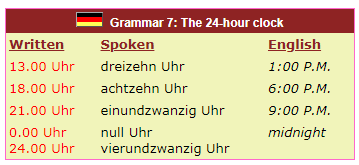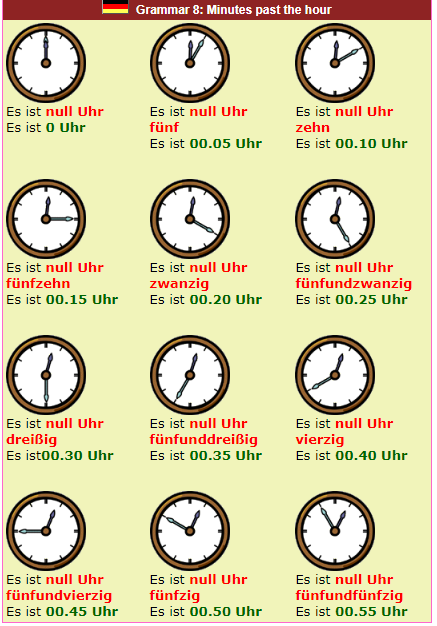The 24-hour clock is used much more commonly in German-speaking countries than it is in Britain - not least because abbreviations such as A.M. and P.M. are not commonly used. But the 24-hour system is also standard practice for all official time-telling including in the media, on train timetables and announcements of events etc. Subtract twelve to get the P.M. time expressed in English.

Minutes after the hour
When expressing the number of minutes after an hour in the German 24-hour system, you add the number of minutes after the word "Uhr" in spoken German. In written German however, the word "Uhr" comes after the minutes.
InformationAlthough midnight can be expressed in the German 24-hour clock either as null Uhr or vierundzwanzig Uhr, you can only use null Uhr when you need to express that it is a number of minutes past midnight. You cannot however say "halb null", just as you cannot say "halb dreizehn", "Viertel nach/vor dreizehn" etc.
Thus the times shown on the previous page would be expressed as follows using the 24-hour system:

Odd numbers of minutes
The twenty-four clock can of course also be used to express times wher the minutes are not divisible by five:
Es ist sechzehn Uhr neunundzwanzig / 16.29 Uhr
Es ist zwanzig Uhr zweiundzwanzig / 20.22 Uhr
Es ist dreiundzwanzig Uhr sechsundfünfzig / 23.56 Uhr
And a German speaking clock always uses the twenty-four system, giving the number of seconds (= die Sekunde (-n)) along with the time in hours and minutes:
Es ist zehn Uhr dreiundvierzig Minuten dreißig Sekunden
(It is ten thirty-four and thirty seconds)
Be punctual!
Punctuality (die Pünktlichkeit) is taken very seriously in Germany. It goes without saying that strict punctuality is expected for business appointments. Note however that if somebody invites you for dinner at 7 o'clock, then that is the time that you are expected to turn up. Arriving "fashionably late" by ten or fifteen minutes - as is common in Britain - is viewed as a social faux pas. So if you find yourself running late, make sure to ring up in advance and inform your hosts!
There is slightly more leeway given in academic circles. When university students have an appointment with their tutors or professors, they should of course be punctual (pünktlich). Yet German universities have a tradition of beginning their classes fifteen minutes after the hour. This quarter-hour is known as the akademisches Viertel. Classes which begin fifteen minutes after the hour are designated "c.t." (= cum tempore) and would be listed as beginning at 9.00 c.t., 10.00 c.t., etc. Courses which begin precisely on the hour are designated "s.t." (= sine tempore) and would be listed as beginning at 9.00 s.t., 10.00 s.t., etc.
 英语
英语 日语
日语 韩语
韩语 法语
法语 西班牙语
西班牙语 意大利语
意大利语 阿拉伯语
阿拉伯语 葡萄牙语
葡萄牙语 越南语
越南语 俄语
俄语 芬兰语
芬兰语 泰语
泰语 丹麦语
丹麦语 对外汉语
对外汉语

